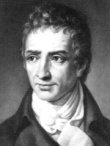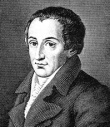Translation by Christoph Werner (Weimar, Thuringia) and Michael Leonard (Petaluma, California)
The
Schlossgasse (Palace Alleyway) in Weimar leads from the Kaufstraße slightly
downhill in a north-eastern direction to the Burgplatz and to the Palace. A
plaque above the door of House No. 6 reminds the passers-by of one of the most
remarkable and also perhaps one of the most enigmatic personalities of the age
of Goethe, August Friedrich Ferdinand von Kotzebue. (This name, which can give
rise to all sorts of puns at the disadvantage of the holder of the name – Kotze
being a very rude word in German for vomit – actually stems from the locality
of Kossebau in Saxony-Anhalt).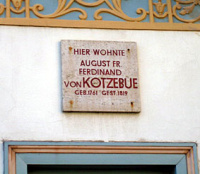
Some people will immediately associate the name with "Czarist spy", since this was drilled into students at German schools. And there was nothing worse in Kotzebue's time than being called "a Czarist spy", Czarist being the incarnation of reaction, and spying for a foreign power was at all times a detested activity. Incidentally, in the DDR (East Germany before 1989), the spies of the Ministry of State Security, popular name Stasi, working abroad, were not even called agents, even less spies, but the more honorable name "Kundschafter", of which a rough translation would be scouts.
This unfounded suspicion against Kotzebue finally led to his insidious murder in Mannheim on March 23rd, 1819, by Karl Ludwig Sand, member of a radical student association in Jena, who had been incited to this deed by the Wartburg Festival (Wartburgfest) on October 18th, 1817.
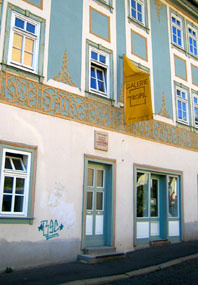 At Wartburg Castle the hater of everything French, the
anti-semite and nationalist Friedrich Ludwig Jahn, (highly honored in Communist
Germany until 1989 by the award "Friedrich-Ludwig-Jahn-Medaille",
which was the highest accolade of the DTSB, the German Sports Federation, for
outstanding merits), had called on students and professors to burn the books of
the enemies of the fatherland. With this he and his followers anticipated the
Nazi book burning of 1933, and, indeed, the Nazis used it as a justification
for their evil deed.
At Wartburg Castle the hater of everything French, the
anti-semite and nationalist Friedrich Ludwig Jahn, (highly honored in Communist
Germany until 1989 by the award "Friedrich-Ludwig-Jahn-Medaille",
which was the highest accolade of the DTSB, the German Sports Federation, for
outstanding merits), had called on students and professors to burn the books of
the enemies of the fatherland. With this he and his followers anticipated the
Nazi book burning of 1933, and, indeed, the Nazis used it as a justification
for their evil deed.
Among the books burned were, besides books by well-known German and Prussian writers and politicians, the Napoleonic Code (Code civil des Français), the first modern civil code written in clearly understandable language. Friedrich Engels said it "was the only modern-bourgeois law book founded on the social achievements of the Great French Revolution and which represented a translation of these achievements into law".
Also burned was Kotzebue's "History of the German Empire".
Where did our glance at Schlossgasse No. 6 lead us? To unruly, excited times, in which August von Kotzebue played an important role.
Kotzebue's father, Legation Councillor at the ducal court in Weimar, died shortly after August's birth on the 3rd of May, 1761. So August and his sister Amalia grew up in the custody of their mother and her brother-in-law, the writer of fairy tales Johann Karl August Musäus. Due to his mother's friendship with Goethe, the "handsome, alert boy" (Goethe) soon found entry into Goethe's house where he had opportunities to play little parts in the ducal amateur theater directed by the Master. Since those childhood days the theater was the great passion of his life. He was to become the most widely known dramatist of his time. At the end of the 18th century he was famous throughout Europe. After a spectacular stage-success in London a regular Kotzebue boom resulted. None of his plays received more acclaim than the play "Menschenhass und Reue" ( Misanthropy and Contrition), written in 1787. No less than thirty translations of his plays were published in 1799 alone. In Poland he had already enjoyed great popularity since 1791, and then in the first decades of the 19th century he became the most important playwright in the entire south-east of Europe, making him an author of continental impact. In Germany the "Krähwinkel" became proverbial as an expression of small-mindedness. His play "Die deutschen Kleinstädter" ("The German Small-Towners") made undisguised fun of the German philistine small-town society. As theater director, Goethe, who despite an early affection did not like the man as a playwright; nevertheless he often staged Kotzebue’s successful plays because they promised a bountiful source of revenue for the theater.
After studying law in Jena Kotzebue pursued an unusual and many-faceted career. Entering government service in Russia (1783), he became secretary to the governor-general of St. Petersburg and was ennobled in 1785. From then on, he called himself "von Kotzebue". He traveled much abroad and spent some time writing for the municipal theater of Vienna. Upon his return to Russia he was arrested, inexplicably, and exiled to Siberia. Emperor Paul I, just as capriciously as he had exiled Kotzebue, had him released a few months later. Kotzebue was given an estate in Livonia and made director of the German theater in St. Petersburg. He published anti-Napoleonic journals.
After a longish interval he was again in the service of the
Czar and, in that capacity, wrote reports on politics and financial and
educational matters in Western Europe. From this originated the claim that he
was a Czarist spy. In reality he had done what foreign newspaper correspondents
all over the world do today.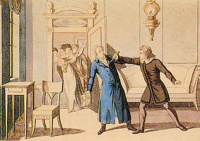
His murder (and the unsuccessful assassination attempt on the Nassau district president Karl von Ibell) led to the Carlsbad Decrees of August 1819, i. e. to the surveillance of university professors and students by special observers, stricter censorship of the press and the persecution of so-called demagogues. The Carlsbad Decrees were abolished in 1848.
Kotzebue's second son, Otto von Kotzebue, became a famous seafarer and discoverer.
If you walk through the Schlossgasse and pass Kotzebue's house, remember Kotzebue, an outstanding poet and writer, who was driven by ambition and thirst for glory, in which he did not differ much from most of his and even our contemporaries. When he, at the age of 58, died a violent death, one group of people were deeply distraught, others rejoiced. His murderer, Karl Ludwig Sand was executed a year after his deed.




